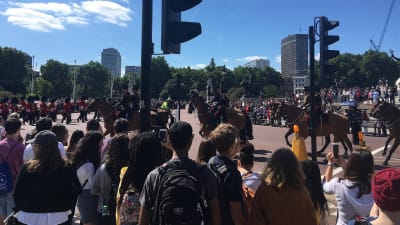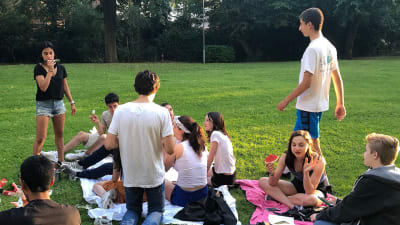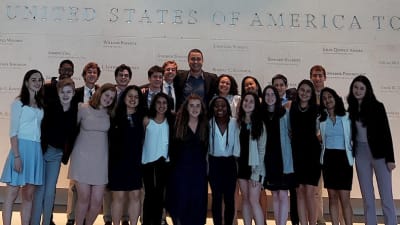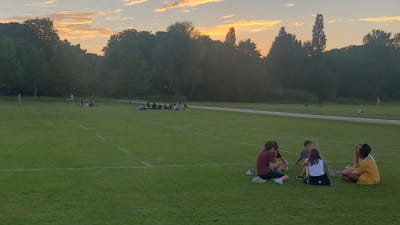SEGL in London: Week Two!
Our second week in London is in the books and boy is there a lot to read about our adventures!
We started strong with a visit to Buckingham Palace, where we experienced first-hand the Mall and the Changing of the Guard. Afterwards, students made and analyzed their own detailed observations at the Queen Victoria Memorial, then debated the fate of the statue (and other similar memorials throughout the UK). Should we honor perhaps the greatest proponent of British colonialism? Are Constancy, Courage, Motherhood, Justice, and Truth accurate descriptors of her character? Is it fair to judge a leader from the past by today’s values?
The conversation served as a great jumping off point for James Warren’s second Skype session discussing the history of 19th and 20th-century Britain (with a particular focus on the Victorian era), which prepared us for our case study on the legacy of the British Empire.
Tuesday brought two memorable guest speakers. In the morning, Dr. Shakuntala Banaji, Associate Professor in the Department of Media and Communications at the London School of Economics, presented her research on the global epidemic of “fake news” and served as an expert resource for the media literacy case study students began last week.
Shortly after she departed, the students hopped aboard the “Tube” to journey to Parliament where they met with Member of Parliament Ben Lake. In 2017, Ben Lake was elected at the age of 24 to represent the constituency of Ceredigion in Wales. He gave the students a glimpse into the behind-the-scenes world of Parliament, touching directly on the impact of Brexit negotiations and sharing some of the leadership dilemmas he faces daily. Two hours (and many selfies) later, students were on their way back to the dorms.
Over the next two days, the students were introduced to two of the three capstone projects they will complete in the coming weeks. The first, the Social Venture Project, challenges the students to identify a need in their home communities and develop a creative solution to tackle it upon their return from SEGL. Soon, students will draft a business plan and present their solutions to faculty and peers for critique.
The second capstone project is a Collaborative Policy Document. After brainstorming potential topics for their document, students engaged in several rounds of voting (a process called “approval voting”) before deciding to focus their research on refugee crises. They will narrow this topic further before beginning their research and, ultimately, presenting before experts.
The latter half of the week provided students with the opportunity to practice an empathetic mindset and develop skills in negotiation and compromise during a “charrette” workshop, led by urban and landscape designer Stephanie Bothwell. This method of urban regeneration seeks to include as many voices of various community stakeholders as possible, and it was fun to see the students consider so many different viewpoints.
To conclude their media literacy case study, the cohort met with Hugo
Greenhalgh,
former
journalist at the Financial Times (his career there spanned over a
decade) and current LGBT+ Editor at the Thomas Reuters Foundation.
Enthralled by his firsthand accounts of
reporting on political turmoil, students left with a better
understanding of the UK’s ever-
changing media landscape.
The final stop of the week was the United States Embassy where students met with diplomat Nic Carter for over three hours, captivated by his depiction of a day in the life of a foreign service officer. Their time there also included a tour of the brand-new embassy building.
Over the weekend, the students took advantage of more opportunities to explore the city. In addition to another outing to Regent’s Park on Friday evening, on Saturday the group headed toward the Palace of Westminster. Some students chose to spend an hour observing London’s Pride Parade while others set out to track down the residence of the UK Prime Minister at 10 Downing Street and explore the historic neighborhoods of London’s political hub. On Sunday, students journeyed to Kensington where they explored the Victoria and Albert Museum, the Natural History Museum, and the Science Museum. Some students then strolled down the road to Harrods, “the world’s most famous department store,” while others returned to the dorms to witness the U.S. women’s soccer team clinch their second straight World Cup title.
Next week will include a deep dive into the legacy of the British Empire and the countries and conflicts that emerged as a consequence of its international interventions. Stay tuned for more updates on what the SEGL cohort is getting up to in London and continue reading for more student reflections!
*Grace: *
SEGL students began Tuesday morning with a thought-provoking
conversation about the implications of media literacy and the global
“fake news” epidemic led by a global researcher and professor, then
spent the afternoon talking about Brexit, Welsh separatism, and
Alexandria Ocasio-Cortez memes with one of the youngest members of
British Parliament, Ben Lake. In the evening, we explored Kilburn,
bought British candy, and watched the U.S. women’s soccer team dominate
its match. It’s no surprise that the day ended with many students
calling it their favorite of the program so far! Tuesday’s two guest
speakers described a common theme of fear and misinformation within
nations with destructive political narratives, whether it be falsified
road accidents in India or perceived immigrant threats during Brexit.
The morning’s guest speaker, Dr. Banaji, met with us in our residential
space to share her perspective on modern media’s role in global politics
through her EU funded research projects. Although MP Ben Lake and
Professor Banaji shared experience and expertise on very different
aspects of our case studies, they both imparted a similar message that
will shape me for the rest of my education: as young aspiring global
leaders of a digitally literate generation, we have the power and the
responsibility to positively contribute to our time’s cultural and
political discourse.
Abi:
My experience with SEGL in London throughout this first part of our
journey has challenged me to think beyond what is typically comfortable
for me. We spent a lot of time discussing the idea of media literacy,
and what that means for us, as global citizens, and consumers of media
on a daily basis. Along with working on our own case studies relating to
bias in the media in the classroom and back at the dorms, we were lucky
enough to hear about the issue from two different professionals. In the
beginning of the week, we heard from Dr. Shakuntala Banaji, a professor
at the London School of Economics; more specifically, the Department of
Media and Communications. Professor Banaji discussed with us the
epidemic of fake news, and how some of her work was centered around
debunking and preventing the spreading of this fake news through mediums
like Whatsapp in places such as India or Mexico. She offered us many
examples of how seemingly innocent messages can truly create an
epidemic, which becomes very difficult to recover from. This perspective
on the topic was particularly interesting to me, in part because fake
news is such a commonly-used term back in the U.S., and this new
perspective showed me how it is an issue not only nationally, but on a
global scale as well. * The second speaker we were fortunate enough to
hear from regarding fake news was Hugo Greenhalgh, a journalist who is
the current editor of Openly, an LGBT+ news website, and who also has
experience working for* CNN and The Financial Times*. He spoke to us
about his on-the-ground experience writing and looking for stories to
tell, and shared with us his view on the fake news epidemic as well. It
was very interesting to hear about the crazy things that he had
experienced as a journalist attempting to find the truth, such as
working for a dictator in Georgia during the time of a revolution. He
explained to our group the importance of fact-checking your sources, and
not only relying on one source for information. I have thoroughly
enjoyed my time here in London, and look forward to learning and growing
even more. *
*Kavya: *
I have found our experiences with guest speakers to be the most
insightful and eye-
opening parts of our time here in London. Every speaker has come
bearing different experiences, expertise, and lessons. The speakers we
met on Tuesday, in particular, had very distinct things to offer, but
challenged me to consider perspectives and ask questions that I had
previously not been comfortable with. I found that the more I leaned
into the discussion and empathized with the speaker, the deeper my
thinking went. Dr. Shakuntala Banaji shared her work in education and
the media and specifically focused on the spread of “fake news.” She
discussed the fake news epidemic as it has spread via various modes of
communication in various places, including via WhatsApp in India,
“TikTok” among the youth, and through highly politicized and trained
groups. It was eye-opening to hear about the tactics such groups online
use, and that helped inform our own sense of fact-checking and *media
literacy. We found her analysis of fake news in context of political
changes, such as the growth of the alt-right in India and Europe,
particularly insightful and relevant. I had previously only really
considered fake news as having minor and harmless implications; however,
Dr. Banaji made it clear that this is not the case. Our afternoon
meeting with MP Ben Lake provided us with a broader perspective into the
life of an active politician, which Mr. Lake described is even more
interesting given the tense climate around Brexit. Nevertheless, his
personable nature and ability to relate with others enabled us to not
only learn about the state of partisanship in the UK, but also for us to
share the state of politics in the United States. *
Diana:
In a change of pace from our more transitional period during week one,
the group swiftly phased into an action-packed week that challenged us
to think critically about a variety of topics from media literacy to the
British Empire, as well as form deeper bonds within our group and
venture out into London more independently. A few specific highlights
were our visit to Parliament to hear MP Ben Lake speak, and our trip to
the U.S. Embassy to meet foreign service officer Nic Carter; both trips
gave us insight into the inner workings of different governmental
operations that we usually wouldn’t be able to experience firsthand.
During the weekend, we also had a chance to explore more independently
around different areas depending on our interests. The group split off
on Saturday to attend the Pride Parade or see 10 Downing Street, and on
Sunday, the group split off to visit different museums. From the Science
Museum to the Victoria and Albert Museum, we were all engaged in
learning more while getting to know each other better. From engaging
speaker sessions to experiencing London more expansively, this week gave
a glimpse as to what the rest of our summer will look like and
introduced us to ideas that had all of us thinking and discussing
*actively. *
Michelle:
This trip has allowed me to learn about different perspectives that are
not really prevalent where I come from. I’ve listened to or been in a
number of in-depth conversations where I was able to understand the
different perspectives which is extremely important to me. In
particular, hearing from Nic Carter at the U.S. Embassy really inspired
me and interested me in regard to the world of foreign service and what
it takes to be a diplomat. As for the exploration in London, it’s been a
moment. All of the weekend sights have been exciting and enjoyable
especially with my community members, from seeing the sunset on Primrose
Hill to exploring the Science and V & A museums and then dashing home to
catch the finals of the women’s soccer World Cup. Finally, our night
time shenanigans, from movie night to dorm talks, daily communal
breakfasts with my dorm mates, and overall bonding have really
solidified my experience in London thus far.

























